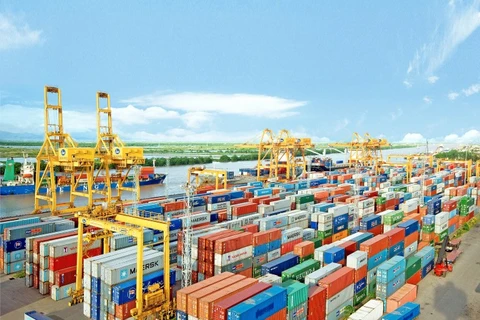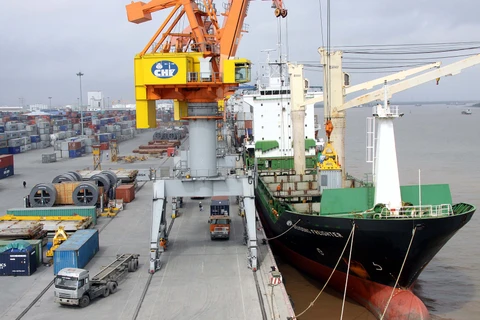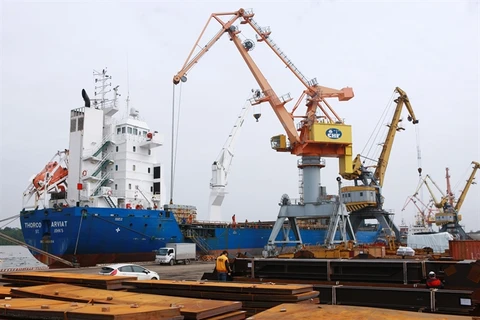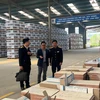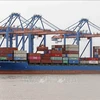 Businesses are annoyed by the increased fees being charged at Hai Phong Port City (Photo: baogiaothong.com.vn)
Businesses are annoyed by the increased fees being charged at Hai Phong Port City (Photo: baogiaothong.com.vn) Hanoi (VNA) - Businesses have complained about the decision to charge high fees for using infrastructure, service facilities and public utilities at all ports in Hai Phong city.
On December 13, 2016, the municipal People’s Committee promulgated a resolution regulating the fees to be charged for construction, infrastructure, service buildings and public utilities in the city. The resolution took effect at the beginning of the year.
Accordingly, individuals and organisations that have shipments stored at bonded warehouses must now pay 2.2 million VND (97 USD) to 4.8million VND (220 USD) per container. This is an increase of nearly 70 percent. The fees for goods in transit are 500,000 VND to 1 million VND.
The infrastructure fee is an expansion of the service costs relating to temporary import and re-export, transit and storage in bonded warehouses, implemented in 2013.
Hai Phong Port now accounts for more than a third of Vietnam’s total cargo throughput, second to Sai Gon New Port.
Many firms are shocked and confused by the decision.
Dao Thi Thu Huyen, a representative of the Japan External Trade Organization (JETRO), told a conference on February 13 that the fees were too high.
The new fees range from around 11 USD per 20-cubic-foot container for regular goods, to up to 100 USD per container for goods temporarily imported for re-export, Huyen said. She said a JETRO survey showed that 65 percent of Japanese firms are worried about the city’s decision.
“Many Japanese companies are confused about what is going on," she said, adding that the collection had not been transparent. Hai Phong city has collected fees even while the infrastructure was not completed. She also said the city should conduct a survey to get opinions on the issue.
Dao Minh Giam, general secretary of the Vietnam Young Entrepreneurs Association, was worried that foreign firms could choose Thailand for their re-import-export destination in the Southeast Asian region instead of Vietnam, affecting the country’s competitiveness.
Pham Thi Ngoc Thuy, deputy General Secretary of the Vietnam Private Sector Forum (VPSF), agreed, saying that Hai Phong had imposed a surprise decision, frightening foreign firms with sudden changes they did not know how to handle.
She added that apart from higher costs, the new fees also result in more paperwork that can require an extra two to three hours to finish. Up to 20 percent of businesses had to rent warehouses for a full day to complete the procedures, resulting in additional costs.
Calculations by experts showed that firms must spend more than 15.2 million USD a year on warehouses and interest rates, apart from the fees paid to the city.
According to the Hai Phong Department of Finance, its ports receive 80 million tonnes of goods each year and can collect 1.5 trillion VND from the proposed fees.
The Vietnam Chamber of Commerce and Industry (VCCI) said it was concerned that the resolution would create dangerous precedent in other air and sea ports, detrimental to export activities of enterprises.
Therefore, VCCI suggested to the Prime Minister that he considers the effects of the policy and direct the competent authority of Hai Phong to explain the reason for the fees, and include an impact assessment.
If there is no reasonable explanation, VCCI proposes a transition time to apply the new regulations. The minimum time should be at least six months to give enterprises sufficient time to prepare and avoid adverse effects.-VNA
VNA
